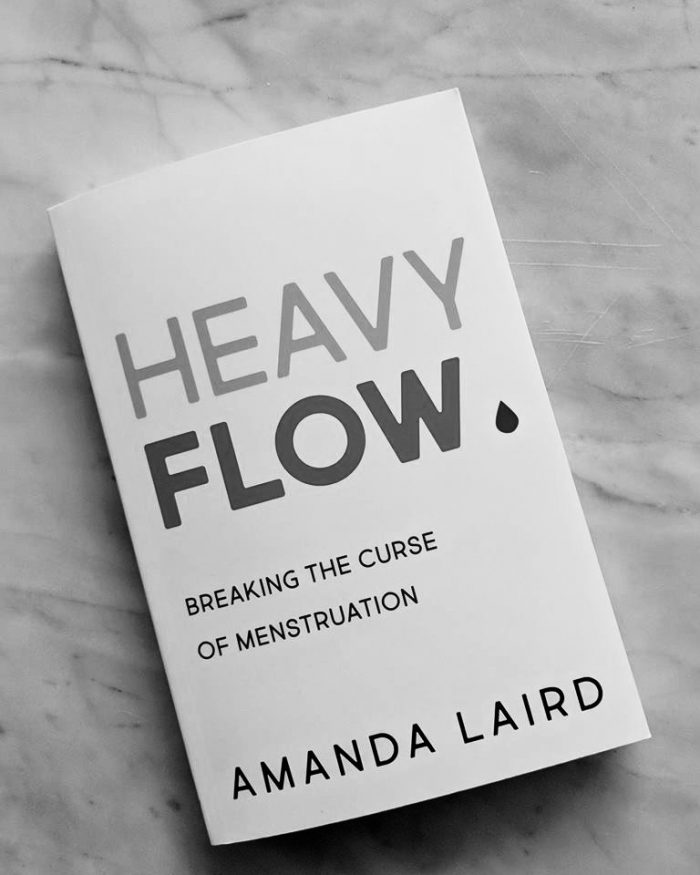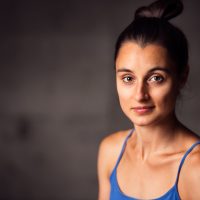I’m honoured to be part of the launch team for Amanda Laird’s new book ‘HEAVY FLOW – Breaking the Curse of Menstruation’. I first came across Amanda’s work through listening to her podcast ‘Heavy Flow Podcast’, which consists of many interviews connected to topics of her work – reproductive health, educating women about their own body and menstrual activism. She describes herself as a feminist holistic nutritionist specializing in menstrual health. Her book is a culmination of the research she’s done over the last couple of years, which I highly enjoyed reading. Because I think, Amanda has important things to say – not only for menstruators – I interviewed her to give people an idea about what she is talking about in her book.
Julia Kannewischer (JK): Why do you think it is so important for women today to talk about menstruation and be more informed about it? What is different about the information you’re providing in your book from the information we receive during education?
Amanda Laird (AL): I know, when I was in school, I learned just the most basic information about menstruation. I learned that a menstrual cycle should be 28 days, no more no less, and that PMS was inevitable and something that we should just expect.
In the book, I argue that, just because pain and other side effects like PMS are common, it doesn’t mean that they’re normal. Where else in our body can we complain about pain and be told ‘don’t worry, it’s normal for your head or your knee or your back to hurt once a month’? I position the menstrual cycle as a vital sign, something that can tell us about our overall health and wellness, not just whether or not we’re pregnant that month, and explain, why it is essential to our health.
JK: What I really appreciate about your work, is how you put menstruation in the context of politics and marketing campaigns and how much we’re still controlled by all of it, can you explain how this relates to patriarchy and suppression of women?
AL: It’s not an accident that we’re not taught about our bodies. When we don’t understand, how our body works, we can’t really advocate for it, which takes away our power. Menstrual products are big business, there are about four or five large companies that are making billions of dollars a year selling various products that are used to manage, disguise, and hide our periods. And while we all should have a way to keep ourselves comfortable during menstruation, these companies aren’t just selling us the solution, but their marketing also sells us the problem. These companies are reinforcing menstrual taboos, telling us that our periods are dirty and gross and something that we need to be ashamed of. And conveniently they sell the solutions to ensure, no one will ever know we’re on our periods.
JK: One of the frequently used terms in your book is ‘body literacy’, how do you define it and what does it mean do you?
AL: Body literacy is a term coined, within this context, by Laura Wershler, a veteran sexual and reproductive health advocate and fellow Canadian! Body literacy is being able to recognize, interpret and understand the signs which our body is constantly trying to tell us. Our bodies are talking to us all day long and all kinds of ways – telling us when to eat, when to stop eating, when to rest, when to move, when we’re in danger. However, we’re often taught to ignore or override these signals. Body literacy is being to understand, what our body is telling us and honouring that, whenever we can. And it’s not just about menstrual cycles, it can also extend to what we eat, exercise and so much more.
JK: Generally, menstruation is understood as nothing very useful, except for when a woman is trying to conceive, why do you think, it is important, that we change our understanding of the menstrual cycle from a health point of view?
AL: Your menstrual cycle is an important physiological function. Hormones like estrogen and progesterone play an important role in our health beyond reproduction, like bone, breast and heart health… We have estrogen receptors in every single cell in our body! This hormone is doing more than just turning us on or making us “hormonal” every 28 days.
We need to start recognizing our menstrual cycle as a vital sign and pushing back against the narrative that period pain and other symptoms are just par for the course. When our period is absent or irregular, or if it comes with a lot of symptoms like pain, headaches, or mood swings, these are signs that something in our body is out of balance. Instead, we just ignore them or pop a pill that makes them go away, without ever addressing what’s at the root of these issues.
JK: Considering different symptoms women are experiencing because of hormonal imbalances, what kind of guidelines and information can they expect to find in your book?
AL: In the book, I don’t offer guidelines so much as tools that will allow you to develop your own body literacy. I don’t believe in perspective diets or protocols, there’s no one size fits all solution when it comes to health. We need to learn how to understand what our body is telling us and how to respond accordingly. That doesn’t mean we need to have a medical degree, just that the best path to health is to listen and observe and see what works FOR YOU.
JK: Without going too deep into details, what is your opinion on the pill and why? Why does it not make sense to take the pill ‘to regulate your cycle’?
AL: I have a lot of complicated feelings about the pill, to be honest. On the one hand, we all need to be able to manage our fertility, but on the other, I don’t think that we really quite understand, how the pill works and what the repercussions are. When we take any type of hormonal contraception it’s not regulating our cycle as we’re often told; it’s actually suppressing our natural menstrual cycle and replacing it with a steady stream of synthetic hormones. The period that you experience on the pill isn’t actually a period, but just a withdrawal bleed as the result of the synthetic hormones. So taking the pill to regulate your cycle or address other side effects of hormonal imbalances like pain or mood swings are just putting a bandaid over top, it’s not getting at the real issue and may even make things worse!
JK: Final question: Why could it be valuable to read your book for any woman and not just women with menstruation related issues?
AL: Menstruation isn’t just a women’s issue, after all, we’re all here because of our mother’s menstrual cycle.
Given how important our cycle is for our health and wellness, I think it’s important that we all understand this. We need to understand how it’s been used against us as a tool of the patriarchy and we need to understand the role it plays in our health.
Non-menstruators will, I’m sure, find the history as angering as it is fascinating and will also get some tools for developing their own body literacy.
JK: Thank you for taking the time to answer these questions. If readers want to know more about you and your book, where can they find you?
AL: they can find me online at www.amandalaird.ca and I am also on Instagram @amandalaird.









Read 0 comments and reply